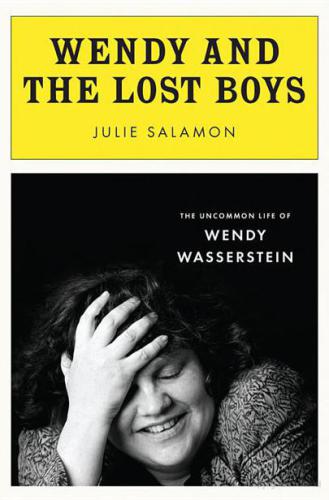
Wendy and the Lost Boys
کتاب های مرتبط
- اطلاعات
- نقد و بررسی
- دیدگاه کاربران
نقد و بررسی

May 9, 2011
Salamon (Hospital) brings full circle the life of Wendy Wasserstein (1950â2006) in this insightful biography of the Pulitzer- and Tony-winning playwright. Despite the autobiographical nature of her work, Wasserstein, as Salamon underscores, was a fiercely private person, doling out personal details to a select few in her large social circle. The youngest child of Polish-Jewish immigrants, Wasserstein was raised in Brooklyn and urged from an early age to succeed, as her four older siblings had, in her career and in parenthood. She graduated from Mount Holyoke and got graduate degrees from City College and Yale School of Drama. Her play Uncommon Women and Others put Wasserstein on the New York theater radar in 1977. Her professional and personal life became increasingly busier, with the production of The Heidi Chronicles (1988) and The Sisters Rosensweig (1992). Salamon highlights Wasserstein's close relationships with the men she called her "husbands," men (primarily gay) to whom she was often attracted, and how these friendships changed when she asked some to donate sperm when she decided to have a child (Lucy Jane was born in 1999, most likely through an anonymous donor). Salamon's thoroughly researched account of a too-short life brings readers as close as anyone to such a private and complex woman.

Starred review from June 1, 2011
From veteran nonfiction author Salamon (Hospital: Man, Woman, Birth, Death, Infinity, Plus Red Tape, Bad Behavior, Money, God and Diversity on Steroids, 2008, etc.), the authorized biography of the playwright who brought the dreams and disappointments of her generation of women to the American stage.
Though she was the first female playwright to win a Tony Award and a Pulitzer Prize (for The Heidi Chronicles in 1989), Wendy Wasserstein (1950–2006) never entirely escaped the judgment of her overbearing mother Lola, whose comment about the Pulitzer was, "I'd be just as happy if she'd marry a lawyer." That wasn't going to happen: Wasserstein's most intimate relationships were with gay men such as playwrights Christopher Durang and Terrence McNally, nonprofit theatrical impresario André Bishop and costume designer William Ivey Long. She jokingly referred to them as her "husbands" and enlisted McNally and Long in her attempts to conceive a child, but it was characteristic of Wasserstein's seemingly open but profoundly private nature that when she did finally give birth to daughter Lucy in 1999, no one knew precisely how she had arranged it. She was similarly secretive about the leukemia that killed her at age 55. Her conflicts and contradictions were as extraordinary as she was, yet plays like Uncommon Women and Others, Isn't It Romantic, The Sisters Rosensweig, and most of all The Heidi Chronicles voiced the experiences of her peers, women who expected to have careers as well as families and painfully discovered that having it all wasn't going to be easy—or maybe even possible. Salamon does a capable job of covering Wasserstein's professional life, including her grad-student days among the legendary mid-'70s Yale Drama crowd that also featured Meryl Streep and Sigourney Weaver. The author's real interest, however—and where the book excels—is in elucidating Wasserstein's complex personality and the creative, unconventional life she fashioned for herself, balancing fraught but committed family ties with a busy social life teeming with devoted friends who in the end shared drama critic Frank Rich's assessment that they "had somehow failed to see Wendy whole." That was, Salamon suggests, because she didn't want them to.
Perceptive and empathetic, but also gently unsparing—a superbly nuanced portrait.
(COPYRIGHT (2011) KIRKUS REVIEWS/NIELSEN BUSINESS MEDIA, INC. ALL RIGHTS RESERVED.)

March 1, 2011
A distinguished author with a range of books to her credit, from nonfiction (Hospital) to fiction (White Lies) to memoir (The Net of Dreams), Salamon now assays biography. Here she considers not just the plays but the life and complex secrets of Wendy Wasserstein, the first woman playwright to win a Tony Award. Should be good, and not just for theater people.
Copyright 2011 Library Journal, LLC Used with permission.

Starred review from June 1, 2011
The Wendy of the title is playwright and essayist Wasserstein. The lost boys seem to be the various men, mostly gay, with whom she became involved, but ironcally, this fascinating biography reveals a whirling dervish of a woman who seems much more lost than her boys. To those who thought that Wasserstein's writings, Pulitzer Prize notwithstanding, were heavy on navel-gazing, Salamon delivers the backstory. Wasserstein was born into a secretive family of overachievers, from whom she was never able to fully disengage. They formed the bases for many of her characters. And, of course, she was the quintessential baby boomer (a group that elevated navel-gazing to an art)growing up in the 1960s, being indoctrinated with the idea that a woman can and should have it all, unwilling to limit her choices, and pretty sure she could outrun death. Unfortunately, after having a child at 48, she died of cancer at 55. Writing an authorized biography gave Salamon access not only to Wasserstein's papers but also to her family and friends. That allowed her to paint a sympathetic yet layered portrait of a warm woman who was able to elevate and belittle herself in the same sentence, who was both driven and never quite certain where she wanted to go. Salamon does what Wasserstein often couldn't in her work: she fully realizes the Wendy character.(Reprinted with permission of Booklist, copyright 2011, American Library Association.)

























دیدگاه کاربران